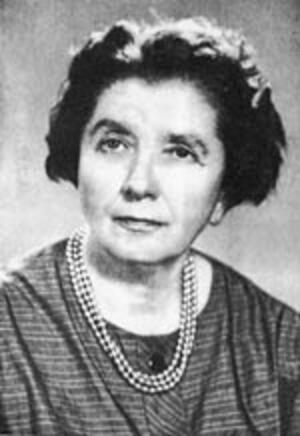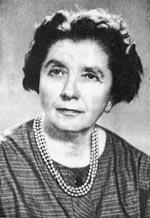Rokhl Auerbakh
"Giving voice to the victims": Rokhl Auerbakh (1903–1976), a member of the Polish-Jewish literary elite, ran a soup kitchen in the Warsaw Ghetto while simultaneously in her writing recording the voices of its captive inhabitants. She ultimately survived the war by passing herself off as an "Aryan," and went on to found the Department for the Collection of Witness Testimony at Yad Vashem in Jerusalem.
Institution: By the Last Way, by Rokhl Auerbach (Tel Aviv: 1977)
Rokhl Auerbakh began her literary career in 1925 in the Lemberg Polish daily devoted to political and cultural issues. She founded and edited a Yiddish literary journal for art and culture, which aimed at being the cultural voice of the Galician Yiddish writer. She moved to Warsaw to continue her literary ambitions and was forced into the Warsaw Ghetto under German occupation. Auerbakh served as the director of the soup kitchen while simultaneously recording the voices of its captive inhabitants in her writing. She left the ghetto in 1943 and survived due to her “Aryan” appearance. After the war she collected testimonial accounts and materials to archive the Holocaust, later founding the Department for the Collection of Witness Testimony at Yad Vashem.
Overview
Rokhl (Rachel, Rachela) Eiga Auerbakh, a prolific Yiddish and Polish author, historian and essayist, was born in Lanowce, Galicia (now Lanovtsy, Ukraine) on December 18, 1903 (although at least one source indicates December 8, 1899), and died in Tel Aviv on May 31, 1976. Her only sibling, Asher-Zelig, died in 1935 while her parents, Khanina and Mania (née Kimelman), died before the Holocaust. Auerbakh studied at the Adam Mickewicz Gymnasium in Lemberg and completed graduate studies at the Jan Kazimierz University of Lemberg, where she studied psychology and majored in philosophy and general history.
Rokhl Auerbach’s personal and literary biography can be divided into three main periods, each instrumental in shaping her complete literary corpus. The pre-Holocaust period in Lemberg and Warsaw (until 1933) laid the academic, literary, and journalistic foundations, which led her during the Holocaust period (while in the Warsaw Ghetto or in hiding on the Aryan side) to transcribe and document, in her unique literary and historical fashion, her personal encounters and the events taking place around her.
Immediately following the Holocaust Rokhl Auerbakh devoted the rest of her life and literary and testimonial writings to the vital cultural creativity of those with whom she came into contact in the major Jewish cultural centers of Lemberg and Warsaw during the interwar period, or in her capacity as the director (for three years) of a soup kitchen in the Warsaw Ghetto frequented by hundreds daily. She devoted innumerable chapters, articles, and entire publications to the description of the many friends, colleagues, acquaintances, and their families who perished during the Holocaust.
Pre-War Literary Career
Auerbakh began her literary and journalistic career in Yiddish and Polish, publishing her first articles in 1925 in the Lemberg Polish daily devoted to political and cultural issues, Chwila. She later edited, published and worked in different departments in the Yiddish daily (Nayer) Morgn until 1930, and edited the literary column of the Po’alei Zion weekly publication Folk un Tsion (1929–1930).
Auerbakh’s most outstanding literary accomplishment in the Lemberg-Warsaw period was the founding and editing in Lemberg of the Yiddish literary journal for art and culture, Tsushtayer (three volumes appeared before 1931), which aimed at being the cultural voice of the Galician Yiddish writer. During the same period she co-edited and published in Yidish, also a journal for the cultural movement in Galicia.
In 1933 Auerbakh moved to Warsaw where she continued her literary, scholarly, and cultural activities. As a member of the Association of Jewish Writers and Journalists in Poland, she published many articles in the major Yiddish and Polish dailies and literary journals in the interwar period: Moment, Haynt, Tog, Naye Folkstsaytung, Literarishe Bleter, Foroys, Shul-Vegn, Nasz Przeglad, Nowy Dziennik, Nowe Slowe.
The themes of Auerbakh’s articles in the above-mentioned publications are drawn from a wide range of topics related to east European Jewish literature and culture: Polish and Yiddish literature, education, psychology, folklore, art, linguistics, and theater. A special and substantial portion of her articles— including those dedicated to general topics such as “women writers in contemporary Polish literature”—are devoted to Yiddish and Polish women writers and artists or to specific women authors, from the seventeenth century to her contemporaries: Yente Bas-Yitskhok, Rokhl Korn, Miryam Ulinover, Fradl Shtok, and others.
Experiences During World War II
Under German occupation, at the initiative of Dr. Emanuel Ringelblum (director of the Warsaw Ghetto's underground archives code named Oneg SabbathShabbat), Auerbakh served for three years as the director of the soup kitchen located at 40 Leszno Street. Ringelblum encouraged her to record her impressions of the events that transpired during the ghetto period. In addition to her ghetto diary, and in response to a call by Ringelblum for compositions entitled “Two Years in the Ghetto,” Auerbakh recorded a description and analysis of the hunger in the first two and a half years of the occupation—“Gets a teler esn: monografie fun a folks kikh” (Give me a plate of food: Monograph of a Folk-Kitchen), which stands out as one of her most vivid descriptions of the ghetto period. The ghetto writings were buried and later unearthed, along with other material from the Ringelblum archives.
Auerbakh left the ghetto for the Aryan side of Warsaw on March 9, 1943, and survived due to her “non-Jewish” appearance and her command of the German language. Employed as a Polish secretary by day, she spent her nights continuing her historical-testimonial documentation. During the fall and winter months of 1943–1944, at the request of the Jewish National Committee to write a composition for an underground tribune which could give the Polish reader an idea of what was going on in the ghetto, she composed two long essays respectively entitled “They Called it Deportation” (about the “Great Deportation” from the Warsaw Ghetto in the summer of 1942) and “Together with the People” (about the Jewish writers, artists and cultural activists in Warsaw). Widely circulated in underground circles, these form the basis of some of her postwar publications. When discovered secretly writing by candlelight, she entrusted the notebooks of her diary—as well as witness testimonial accounts—to Dr. Jan Zabinski (the director of the Zoological Gardens in the Praga suburb of Warsaw) to be buried on the premises. These too were unearthed with the retreat of the Germans from Warsaw in April 1945.
Even before the war was completely over, Auerbakh immediately became active in the documentation of events and the collection of testimonial accounts and materials. On November 7, 1945, as a member of the delegation of the Polish State Committee for the Investigation of Nazi War Crimes on Polish Soil (a fact-finding mission), she visited Treblinka and published her historical reportage account of the camp, its machinery and its victims. As a member of the Central Jewish Historical Commission in Łódź, she edited the literary and historical pages of its publication Dos Naye Leben. She also actively participated in the beginning of the publication of witness accounts in Yiddish and Polish, preparing a guide for the taking of testimony as well as a questionnaire concerning specific topics. Together with Hersh Vasser (the secretary of the Oneg Shabbat archives in the Warsaw Ghetto), she struggled and finally succeeded, in December 1946, in organizing the unearthing of the first half of the Ringelblum archives, in which her ghetto writings remained hidden.
Post-War Accomplishments
In 1950, Auerbakh moved to Israel, where she devoted the remainder of her life to gathering testimony from survivors and publishing her Holocaust period writings and testimonial memoirs in various forms. As founder and director of the Department for the Collection of Witness Testimony at Yad Vashem in Jerusalem, she was responsible both for its rapid expansion and for incorporating and initiating new methodologies in its testimonial documentation. In this capacity she published articles on the progress of the department and its activities, encouraged the writing of personal memoirs and was active in the publication of the Yizkor memorial books which focused on specific communities. Auerbakh reviewed major publications which spoke about the Holocaust, including diaries and scholarly accounts, and criticized the commercially successful fictional novels about the Holocaust, which claimed to be based on historical fact.
Auerbakh’s post-Holocaust writings pay tribute to the cultural creativity of the Jews before and during the German occupation. They are, for the most part, a montage of fragments from her Holocaust writings, with—as a result of her unending search for historic details—additions as to the fate of the victims. Her reflections, impressions and analyses are always fused with historical-testimonial strength. The contents of her publications are not presented in a chronological order of events and encounters, but rather are divided into short chapters which deal with a specific theme, person, group of people or event. At times sentimental, her writings contain lyrical interludes, frequently drawing on classical Jewish sources and religious practices to express her historical and literary inclinations. Auerbakh, who represents and presents a Jewish woman’s perspective, is always conscious of women’s participation in the cultural life of pre-war Poland and during the Holocaust, a point of view already apparent in her pre-war publications.
Selected Works by Rokhl Auerbakh
Rokhl Auerbakh’s Personal Archives (Inventory no. P–16) can be found in Yad Vashem, Jerusalem. The archives contain personal, published and unpublished manuscripts in Polish and Yiddish, preparatory material concerning her testimony at the Nuremburg and Eichmann Trials, declarations, correspondence, recordings, photographs, film, scripts (in Polish, Yiddish and English), and administrative documents concerning the Department for Collecting Witness Testimony at Yad Vashem.
Books
In the Fields of Treblinka: Reportage (Yiddish). Warsaw- Lodz-Cracow: 1947.
The Jewish Uprising in Warsaw 1943 (Yiddish). Warsaw: 1948.
Our Reckoning With the German People (Yiddish). Tel Aviv: 1952.
In the Streets of Warsaw 1939–1943 (Hebrew). Tel Aviv: Am Oved, 1954.
The Warsaw Ghetto Uprising (Hebrew). Tel Aviv: Hamenorah, 1963.
In the Land of Israel: Reportage, Essays, Stories (Yiddish). Tel Aviv: Perets Publ., 1964.
Warsaw Testaments: Encounters, Activities, Fates 1933–1943 (Yiddish). Tel Aviv: Yisroel-bukh, 1974.
On the Last Journey: In the Warsaw Ghetto and on the Aryan Side (Yiddish). Tel Aviv: Yisroel-bukh, 1977.
Warsaw Testaments: Encounters, Activities, Fates 1933–1943 (Hebrew). Tel Aviv: Yisroel-bukh, 1985.
Warsaw Testament. Translated by Samuel Kassow. Berkeley, CA: White Goat Press, 2024.
Kagan, Berl. Lexicon of Yiddish Writers: With Additions and Corrections to the Lexicon of the New Yiddish Literature, and 5,800 Pseudonyms (Yiddish). New York: R. Ilman-Kohen, 1986.
Lis, Avraham. Home and Endurance: About Writers and Their Works (Yiddish). Tel Aviv: 1960.
Levin, Itamar. Walls Around (Hebrew). Tel Aviv: Praeger, 2003.
Paulsson, Gunnar S. Secret City: The Hidden Jews of Warsaw 1940–1945. New Haven and London: Yale University Press, 2002.
Ravitsh, Melekh. My Lexicon: Yiddish Publicists, Journalists, Actors, Artists, Party Leaders, and Cultural Activists in Poland between the Two World Wars (Yiddish). Montreal: 1947.
Ravitsh, Melekh. My Lexicon: Yiddish and Hebrew Writers, Story-Tellers and Publicists in the State of Israel, as well as Artists and Public Activists (Yiddish). Montreal: 1958.
Roskies, David G. Against the Apocalypse: Responses to Catastrophe in Modern Jewish Culture. Cambridge, Massachusetts/London, England: Harvard University Press, 1984.
Roskies, David G. The Literature of Destruction: Jewish Responses to Catastrophe. Philadelphia-New York-Jerusalem: The Jewish Publication Society, 1989.
Zuckerman, Yitzhak (Antek). A Surplus of Memory: Chronicle of the Warsaw Ghetto Uprising. Berkeley-Los Angeles-Oxford: University of California Press, 1993.




